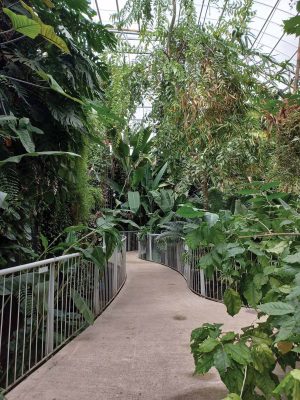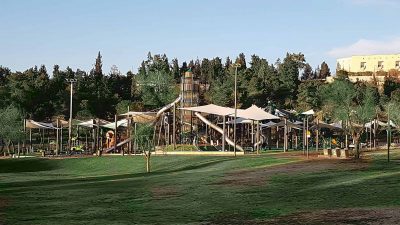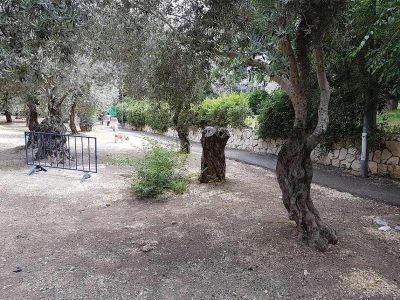
by: Terry Mason, Director of International Development
Jerusalem is Israel’s largest city. King David’s description thousands of year ago is still accurate today: “Jerusalem is built as a city that is compact together” (Ps. 122:3). There is a perpetual housing shortage and people continue to flood into the capital. Thankfully, the parks and gardens of Jerusalem provide room for the bulging population to breathe and get outside. Its springtime in Israel, and just as the biblical prophets foretold thousands of years ago, the desert land is indeed blossoming! “The wilderness and the wasteland shall be glad for them, and the desert shall rejoice and blossom as the rose” (Isa. 35:1).
Not so long ago if you were to visit Jerusalem, it would have looked desolate. Today it is hard to envision the miracle that has happened, because everywhere you look, trees and greenery surround you. Green space is essential for quality of life. Here are a few of the parks and gardens that make Jerusalem such a special place.

The current Jerusalem Botanical Gardens opened to the public in 1985, though its roots go back to 1931. It hosts about 10,000 species geographically arranged to represent most parts of the world. The garden’s Japanese section contains over 150 bonsai trees, the largest concentrated collection in the world. The 500-meter (1,640-ft.) Bible Path highlights many of the 400 types of plants mentioned in the Bible. The tropical conservatory, renovated and expanded last year, is now open to the public again. It contains a wide variety of tropical plants and trees, including many orchids. Over the years, Bridges for Peace has sent volunteer groups to help with big and small projects at the gardens.
Every week on Shabbat (Sabbath) afternoon, my wife, Robbie, and I go to the Wohl Rose Garden. If you are arriving from downwind, you know you are near the garden as the fragrant aroma of the thousands of roses fills the air. Covering 19 acres (7.6 ha.), it is the largest rose park in Israel.
The garden was established in 1981 by the Jerusalem Foundation and boasts 400 varieties of roses with over 15,000 rose bushes from around the world. Many of them are gifts from other countries. The Garden of the Nations was added in 1984. Each section contains indigenous species and landscaping styles characteristic of the country that donated it, namely Germany, Japan, Holland, Switzerland, Argentina, Canada, France, Austria, Spain and the UK. The rose park is located in between the Knesset (Parliament) and Israel’s Supreme Court. The park also has many sculptures from a variety of international and Israeli artists.
 Sacher Park
Sacher ParkIn the center of West Jerusalem, Sacher Park is a central meeting place for people from all across the city. Created in 1963, it is the largest green space in Jerusalem at 40 acres (16 ha.). Major new upgrades to the park and its facilities include a huge play area for children with an 11-meter (36-ft.) high, 22-meter (72-ft.) long slide and a 9-meter (30-ft.) high skywalk.
On the southwest edge of the park you will find the Jerusalem Bird Observatory (JBO), where 223 bird species have been recorded to date. (A full article about the JBO can be found on pages 18–19 of the February 2021 edition of the Dispatch from Jerusalem).
 In 1978, barren ground without a single tree in the valley slumped near what was then the southwest edge of the city. In 1987, olive trees were pulled up in Samaria to clear an area. The tops of the trees were cut off, and the stumps were dumped on the ground in the empty lot in the valley on the southwest edge of Jerusalem. The stumps laid on the ground, totally exposed and dry for three years. In 1990, the municipality got around to planting them. The following winter, there was a big snowfall with over 60 centimeters (2 ft.) on the ground. The snow melted into the soil and watered the dry roots of the trees. In the spring, signs of life started to show in the trees and almost all of them survived, putting out new shoots from the stumps. Today there must be over 100 beautiful olive trees in Denia Park. Families enjoy making picnics in their shade, especially on Israel’s Independence Day.
In 1978, barren ground without a single tree in the valley slumped near what was then the southwest edge of the city. In 1987, olive trees were pulled up in Samaria to clear an area. The tops of the trees were cut off, and the stumps were dumped on the ground in the empty lot in the valley on the southwest edge of Jerusalem. The stumps laid on the ground, totally exposed and dry for three years. In 1990, the municipality got around to planting them. The following winter, there was a big snowfall with over 60 centimeters (2 ft.) on the ground. The snow melted into the soil and watered the dry roots of the trees. In the spring, signs of life started to show in the trees and almost all of them survived, putting out new shoots from the stumps. Today there must be over 100 beautiful olive trees in Denia Park. Families enjoy making picnics in their shade, especially on Israel’s Independence Day.
Denia Park is a living example of the wisdom found in Job 14:7–9: “For there is hope for a tree, if it is cut down, that it will sprout again, and that its tender shoots will not cease. Though its root may grow old in the earth, and its stump may die in the ground, yet at the scent of water it will bud and bring forth branches like a plant.”
These are only a small sample of the green spaces one may enjoy in the capital. There are many more parks and gardens scattered throughout Jerusalem. We welcome you to come and explore them the next time you visit Israel.
Photo License: Click on photo to see photo credit
All logos and trademarks in this site are property of their respective owner. All other materials are property of Bridges for Peace. Copyright © 2025.
Website Site Design by J-Town Internet Services Ltd. - Based in Jerusalem and Serving the World.